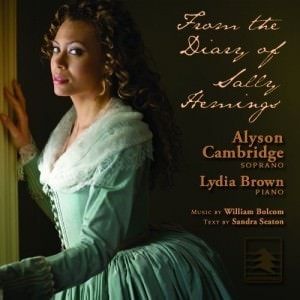Alyson Cambridge is appearing as Julie LaVerne in Washington National Opera’s critically acclaimed production of Show Boat. I asked Alyson about playing Julie in Show Boat in Chicago and DC, growing up in the DC area, her vocal training, and roles she would love to play.
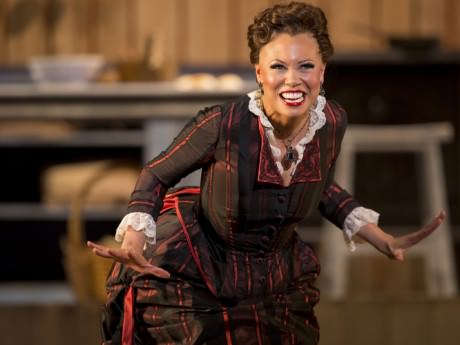
Joel: You are playing Julie LaVerne in Show Boat at The Kennedy Center after playing the same role in Chicago at The Lyric Opera. How has your performance evolved since you played it in Chicago and how has the production been tweaked for The Kennedy Center production and space?
Alyson: I’ve lived with this character for over a year now, and there are things about Julie, about her journey in the show that I am more aware of now, things that I choose to bring more attention to and play on more. I also feel a personal connection to her, so I genuinely care how she is portrayed and want to always find the best ways to enhance my performance. There are have been a few tweaks here and there, but nothing major. You always have to readjust a bit depending on the space.
Who is Julie LaVerne and how do you relate to her?
We meet Julie as the leading lady/star actress on the Show Boat – full of light, life, charisma. What we don’t realize until halfway through act 1 is that she’s keeping her true identity (being of mixed race – half black, half white) a secret and that her marriage to the leading man on the boat, Steve, who is white, is illegal. When she and Steve are essentially forced to leave the Show Boat, we don’t then see Julie until years later. At that point she is a shell of the woman she once was, consumed by alcoholism, having lost the man she loves, and struggling to maintain her career as a top actress and singer given all of her struggles. As a bi-racial woman myself, there are certainly parts of Julie to which I can relate. I am fortunate to live in a time now where I have never been forced to hide my racial heritage, but like Julie, have been made aware of it, and sometimes not in the best of circumstances.
What themes from Show Boat and Julie’s story have not really changed since Show Boat was written in 1927?
I think America has come a long way, particularly with respect to race relations. It’s not to say we don’t have farther to go, but to the point of Julie and her mixed heritage being a major theme in particular, lest we forget we have a bi-racial President. There are still many themes, however, that have not really changed. Show Boat deals with addiction on several levels – alcohol, gambling, as well as single motherhood. These themes and issues are still very much present in 2013.
What does Show Boat have to say to theatregoers in 2013?
I think Show Boat gives us an honest and insightful depiction of America’s history – through the issues it presents, the styles of music, dance, songs that span the decades the show covers. The use of the “n” word (albeit sparingly in this production) and terms like “colored folks” were very much a part of the American vernacular back then, as was the fact that African Americans and Caucasian people did not often intermingle and work together or share the same strata in life as they do now. It may be shocking to some theatergoers to be reminded of such things, but the Edna Ferber novel on which Show Boat is based, was a very real and authentic depiction of America in late 19th and early 20th century. Our director Francesca Zambello has done a truly incredible job of putting all of that, and Kern’s music and Hammerstein’s libretto into a show that takes the audience on a journey where you really care about the characters, the issues, their struggles, highs, lows, and everything in between.
You were raised in the DC area. When did you first want to become a singer? Who were some of your musical influences when you were growing up?
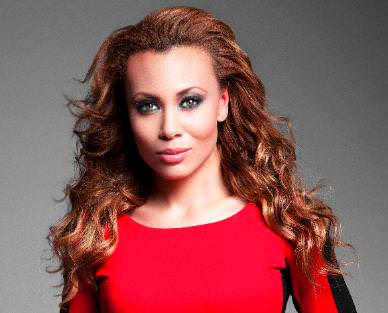
I always knew I wanted to be a performer of some sort – whether it be a singer, pianist, an actress. But I always thought I’d actually end up being a lawyer and even studied it, along with voice, in college. But my theatrical and musical side was what won out in the end. I had wonderful teachers at the Levine School of Music, where I took my voice lessons throughout high school, and lots of encouragement from my friends and chorus and theater teachers at Sidwell Friends School. Musical influences really ranged! I went from Whitney Houston to Pearl Jam and Nirvana to Christina Aguilera to Tupac! I just liked anything that appealed to me for whatever reason. I never limited myself. Classical music was always a part of my life though, from age 4 playing the piano, so that was never that far away no matter what.
You didn’t originally want to become an Opera singer. Why did you change your mind and which opera singer(s) influenced you? Which young opera singers today are your favorites?
No, if I was going to be a singer, it would have been a pop singer. But that was not my voice! I was a great mimic as a child and could imitate anyone I heard, but it was opera singers that I could “do” best. I think it was my first voice lesson, at age 12, when my teacher looked at me wide-eyed in disbelief that I was so young but apparently sounded like I was 18 and “just had a natural ability” that I thought, “Hmmm, so you’re saying I should be an OPERA singer not a pop singer???” that I started to change my tune a bit.
When I went to a summer program in high school and met other teenagers that sang classically like I did, I thought, “OK, I’m not the only one! This is pretty cool!” When I first began classical voice lessons, Kathleen Battle was “the” opera diva of the day. I certainly looked to her for inspiration as a young girl just starting out. And throughout college, it was Renee Fleming. I had one of her CDs I listened to on constant repeat. That I’ve shared the stage with Renee and have come to know her as both a gracious and lovely person and colleague is great…you realize things have come full circle. Young singers today?! That’s too hard to answer. There really are so many wonderful up and coming young singers, some very good friends of mine, and I’d hate to leave anyone out!
How would you describe your voice and how has it changed and matured since you began singing opera?
I’m a full lyric soprano, but some might say lirico spinto, actually. When I began my career, my voice was, by nature and age, just lighter, rich but light, and not as powerful as it is now. With age, time, technique, it has maintained its range (I still have those stratospheric notes some associate with coloraturas!) but it’s just “filled out,” gotten warmer and darker in color, and has more “meat” to it than when I was just starting out. It’s great. It’s where I always felt my voice would go and now I get to sing the repertoire I always wanted to. Those who have known me well from the beginning of my career said that always knew this is where my voice was headed, so it’s nice to finally be there.
Where did you receive your operatic and vocal training?
In DC, in grade school and high school, it was at the Levine School of Music. Undergrad was Oberlin College and Conservatory of Music in Oberlin, Ohio. Then one year of grad school at The Curtis Institute of Music in Philadelphia, followed by three years in The Metropolitan Opera Lindemann Young Artist Development Program.
What have been some of the biggest challenges you have faced trying to succeed in the Opera World?
I think like any career in the performing arts, this career requires a lot of resilience, persistence and pure hard work. There will be “bad voice days,” days you are told “no” or that someone else got the part you wanted, the day the audition that you thought you nailed doesn’t pan out after all. But you have to pick yourself up and keep going! It is a very subjective world – voice, stagecraft, looks, and musical choices. You simply can’t be everyone’s cup of tea, so you have to know that. And then you have to work hard, be the best you can possibly be and know that you ARE someone’s cup of tea…and go out there and nail that next performance!
You have been appearing with The Washington National Opera for several seasons. Why do you enjoy performing with them at The Kennedy Center and which role has been your favorite at WNO?
Show Boat is my fourth show with WNO. I also did another production with Francesca – Porgy and Bess – which was my debut in 2005. I have great memories of that cast and production process. I also was Musetta in a rather “racy” and controversial production of La boheme. Controversial as it was, I still had lots of fun with my dominatrix character in that show. There’s nothing like singing in your hometown. Feeling that hometown support coming from the audience makes a difference. I love seeing family, friends, and former teachers in the audience! And, I love the WNO chorus, stage management and music staff!!! After 4 shows together, coming back to WNO for a show feels like a homecoming!
When you first stepped on The Kennedy Center Opera House stage, what was going through your mind?
“Wow! I’m actually singing at The Kennedy Center — THE Kennedy Center!!! I’m so excited for my friends and family to come see me!!!” It’s an iconic building in the DC landscape and I saw countless shows at The Kennedy Center growing up, so to be a part of the action onstage felt like a great accomplishment to me.
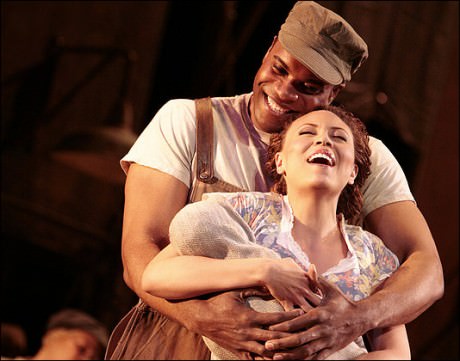
You mentioned you played Clara in Porgy and Bess at WNO. Do Clara and Julie share similar qualities and struggles?
I don’t see too many similarities between the two roles. Clara really represents the light and hope of Catfish Row – a young, beautiful, hopeful mother. Julie, although bright and shining in the beginning, is more complex and her character arc is greater. And although both characters have tragic “ends” – Clara’s in death in the hurricane and Julie’s in alcoholism — your heart bleeds for Julie, and you find yourself wondering what could have been had her circumstances not been what they were to lead her to that place.
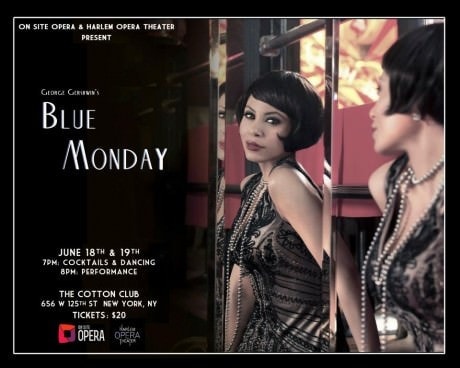
You are going to play VI in Gershwin’s opera Blue Monday at The Cotton Club on June 18th and June 19th. It’s a short opera. When was it written and what’s it about? And tell us about Vi.
It was completed and premiered in 1922. Gershwin’s first “jazz-opera” about a gambler, Joe, his girlfriend Vi, Tom who pursues Vi despite her rejections, and what happens when they all come together one night at a jazz club, and lies are told and things go awry! Vi is a beautiful but jealous woman, and her jealousy gets the best of her – and others.
How did you get involved in Blue Monday? Had you ever heard of it before you were asked to appear in it?
I’ve worked with On Site Opera founder and Director Eric Einhorn before. He was familiar with my work on other Gershwin projects, particularly Porgy and Bess which was influenced by Blue Monday. It was a natural fit.
One of your charities is Sing for Hope. Tell us about it and why our readers should support it.
Sing for Hope is a wonderful charity founded by two good friends and colleagues, Monica Yunus and Camille Zamora. heir overall mission is making the arts accessible to all, particularly those who may not otherwise have access or exposure to the arts. Please visit their website for their mission statement.
Your debut solo CD is called From the Diary of Sally Hemings. Why did you choose Sally Hemings as the subject for your first CD? Who wrote the music?
The subject, music, and libretto were chosen and written by famed American composer William Bolcom and librettist Sandra Seaton. I was thrilled when they approached me to bring Sally to life in the interpretation of their song cycle. She is a fascinating woman and part of American history.
I recently visited Monticello and on our guided tour through Thomas Jefferson’s home the tour guide was asked why there is still a ‘cover up’ about Jefferson’s relationship with Sally Hemings and she just stared up at the ceiling and told us to move on. What did you learn about Sally Hemings while researching and recording the CD and how should history look at her and Jefferson’s relationship? How should she be remembered?
I learned as much information as I could about Sally and her life. There is quite a bit that can and will never be known, but I did a great deal of research to find out as much as I could about her family history and her relationship with Jefferson. I cannot say how she “should” be remembered, but I choose to remember her and believe she is certainly portrayed in the recording as a woman of strength, conflict, passion, both a victim and great survivor or her time and circumstance in life and love.
What roles are you yearning to play that you haven’t yet played?
Tosca and Carmen. Very different, yes, I know! But they both speak to me for different reasons and I look forward to sinking my teeth into them vocally and dramatically.
What advice can you offer to a young girl who is considering making singing and opera her career?
Find a great teacher – someone you really trust with great ears and you have a good rapport with, don’t sing things that are too big too soon, work hard, take care of yourself, and stay positive!
What do you want theatregoers to take with them when they leave The Kennedy Center after watching your performance in Show Boat?
I want them to leave and say “Wow, that was a great show!” and in that, I mean that they laughed, cried, pondered, reflected, reminisced, tapped their toes, sang along, smiled and felt truly satisfied by what they just experienced.
Show Boat plays through May 26, 2013 at The Kennedy Center’s Opera House – 2700 F St. NW, in Washington, DC. For tickets, call the box office at (202) 467- 4600, or purchase them online.


